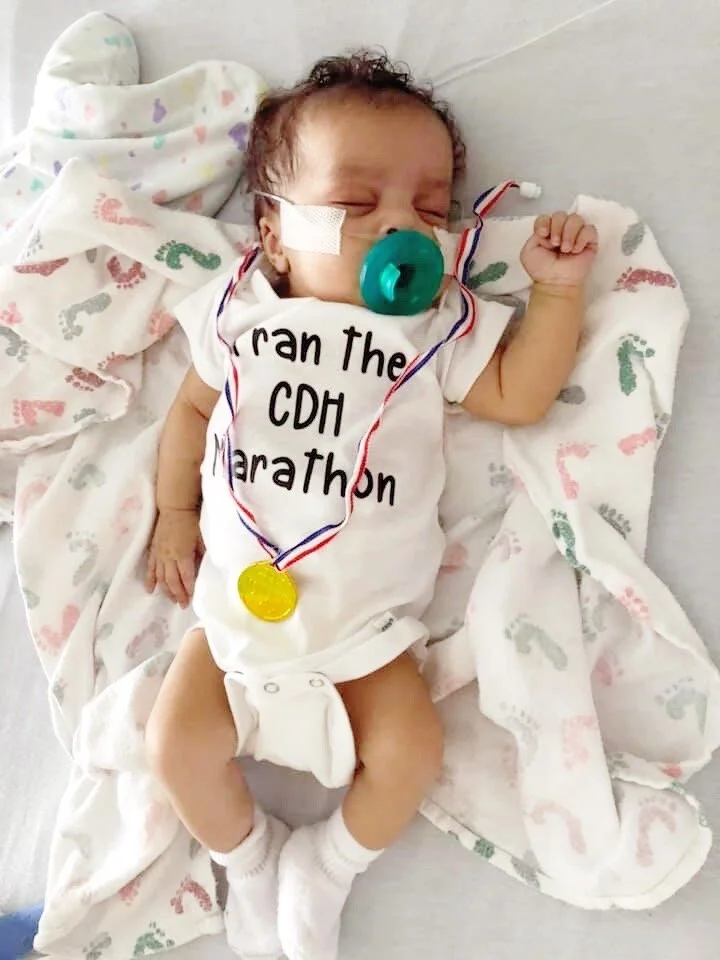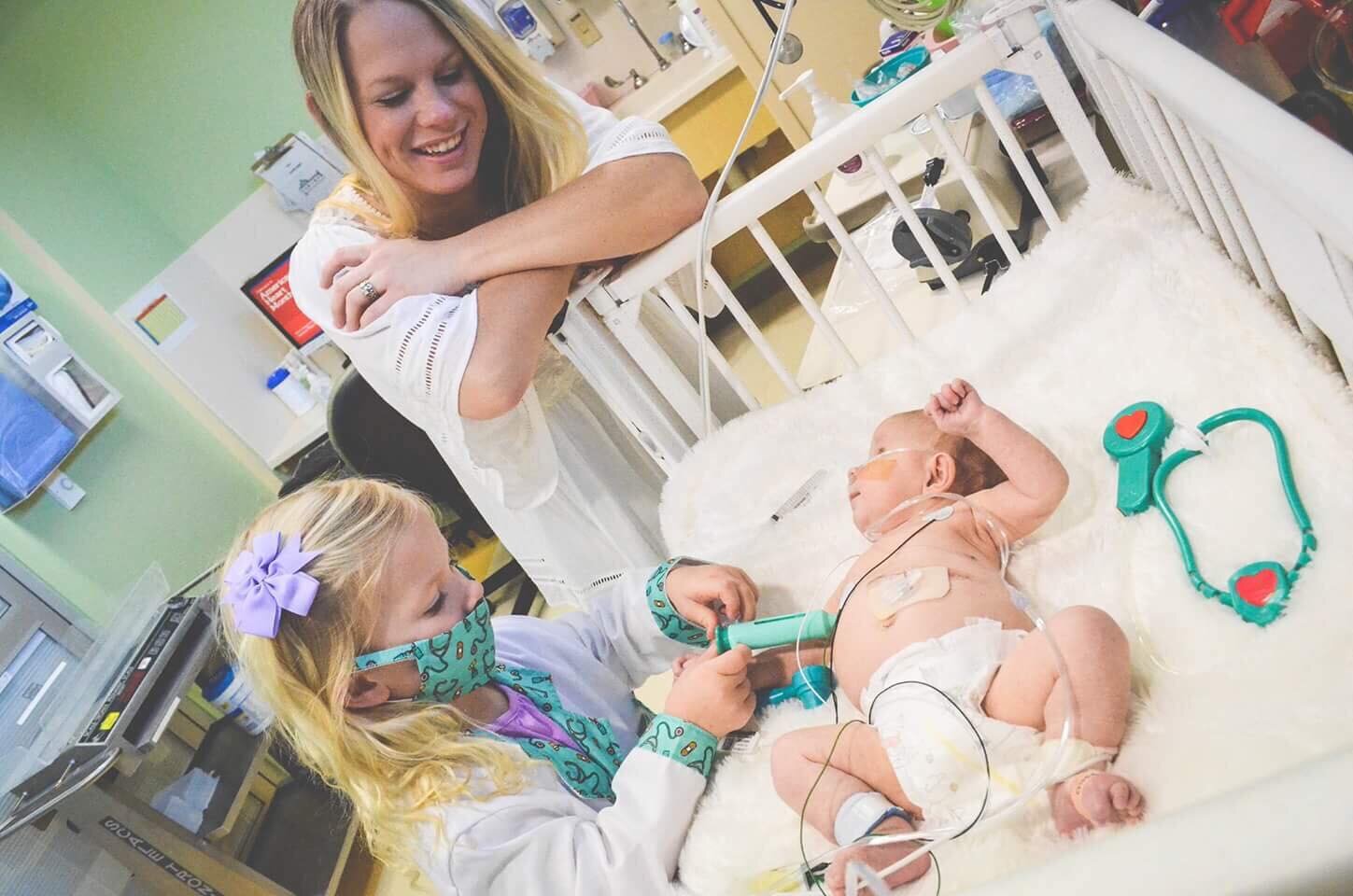Taking your CDH Baby Home
You did it! You've made it through a CDH pregnancy, delivered a Tiny Hero, sent your baby into surgery more times than you'd like to remember, and finally, after several weeks or months in the hospital, the word "home" was officially mentioned! Your baby is going home, and it's happening soon! But now what? For their entire life, someone else has been calling the shots and making sure everything from feeds to meds to therapy happened on time, and now it's all on you. Depending on the level of medical care your baby will require at home, this may seem very overwhelming! After all, you aren't just putting on the mom hat. You are also their nurse, therapist, nutritionist, medical coordinator, respiratory tech, teacher, and number one advocate. You are about to wear so many hats, and their life is now entirely in your hands. No pressure, right? But don't worry! No matter what crazy mix of emotions you feel as the discharge date approaches, it's all totally normal, and you've got this! You've been training for weeks or months to take on these new roles, and no one will be a better advocate for your child than you. No one will wear the hats better than you! Although that being said, there are things you can do the last week or two before discharge that will set the tone and make the transition home as smooth as possible for everyone!
Ask Questions: Be sure to use the days leading up to discharge to learn as much as you can and solidify your understanding of all things CDH. This will be your last chance to easily pick their brains, so don't be afraid to ask questions!
Learn New Equipment: During the last few days in the hospital, you will likely receive training(s) on any equipment your Tiny Hero will be going home with (trach, oxygen, G-tube, ng tube, medication, etc.) as well as learning infant CPR. Be sure you can confidently use everything, and don't be afraid to ask them to go over things again if you are ever unsure of something. If this is your first baby, you will also want to make sure the car seat is correctly installed and adjusted to their size. Finding a CPST (certified car seat expert) can help. Many fire departments offer experts that will check for proper installation.
Know the Schedule: Before leaving the hospital, be sure to write out a tentative schedule that mirrors the hospital. On the schedule, you can include the times medications need to be administered, feed times, sleep times, and even the times you may need to pump or work.
Creating a Medication Schedule: Some CDH babies will come home on numerous medications that need to be given at various times of the day and night. Setting alarms on your phone can be helpful until you get into a routine. Another trick that definitely helps is to order lots of syringes and fill them all at once each morning for the entire days worth of meds. Having them filled ahead of time will ensure that nothing is forgotten and that the correct dose is given every time (especially overnight when you are exhausted!). You can store the syringes in bags labeled with the time of day they will be given.
Next Step of the Care Plan: The hospital will likely require setting up a pediatrician appointment before discharge. We have tips and tricks for finding the right pediatrician in this blog, so be sure to check it out. Before leaving the hospital, also be sure you understand the surgeon's/hospital's role in your child's life going forward. Will you go back for clinic visits? If so, how often? What level of involvement will they have in medical care in the future? What specialist(s), if any, do you need to arrange locally? And finally, do they recommend therapy? If so, many states offer free programs for children under three. These are often called "Early Steps" or "Early Intervention." Look into whether or not your state offers these services and if they do, call immediately to get them on the schedule for evaluation. Depending on your area, it often takes 1-3 months for the initial appointment. If nothing is offered through the state, talk to your insurance to figure out your options and then call around to find the right place. When you call, be sure to mention that your child is medically complex and ask if it is possible to do therapy at home to avoid germs.
Set up the House: Many people wonder what they have to do to prepare the house for their baby's homecoming. This will largely depend on the baby's needs at discharge, but remember that if the house isn't perfectly ready with a Pinterest-worthy nursery, that's okay! Your baby won't be doing much or needing much for a while, so you will have plenty of time to get all of that figured out if you haven't already! Initially, you'll just want to ensure they have a cozy place to sleep that meets their current needs. Many people like to replicate the mobile, sound machines, or items used in the NICU to make their crib feel more familiar. You'll also want to make sure to have certain essentials on hand immediately, such as a thermometer, pulse ox (owlet), a baby monitor, a swaddle, and so on. We have a list of all of our favorite products here.
Make Travel Plans: Travel will look different for everyone depending on how far away the hospital is and what method you choose to use to get home. If you are traveling by plane, we have a lot of advice in this blog to ensure safe and easy travels. For traveling by car, be sure to give yourselves plenty of time to get home. Take breaks along your drive and spend the time enjoying your baby's first real car ride! Emotions can run high the last few weeks in the NICU, and there is no reason to push yourself any harder than necessary by trying to race to the finish line.
Establish a Visitor Policy: Upon arriving home, you may be inundated with family and friends that want to see or hold your baby. Be sure to establish your perimeters ahead of time. Consider if you will allow everyone to come to visit or only certain people initially. Do you want company immediately, or do you want a few days to settle in? Will you allow kids to visit? Will those people that visit be allowed to hold your baby? You'll definitely want them to be healthy, but is it okay if they have been around people who have been sick? Are you going to require visitors to be vaccinated with anything in particular (pertussis, flu, and COVID-19 tend to be common choices)? Take a few minutes to decide on your perimeters and set your boundaries, then reach out to everyone and let them know your expectations. They have witnessed your journey the last several weeks/months and should understand and support any visitor policy you create; however, it helps to make it known prior to arriving home, so everyone has the same expectations from the beginning.
Start Record-Keeping: Now that you are almost home, the medical records and documents will start pouring in. As soon as you get home, it's great to create a place to file all of the random documents as they arrive. It is also beneficial to create a one or two-page concise medical history form. This form will include hospitalizations, surgeries, medicine taken, diagnoses, allergies, names and numbers of their doctors, and any other relevant information. Why? Well, your baby will likely start having many appointments, and at each one, you will be handed a stack of papers to fill out (while juggling a newborn, oxygen tank, and all of the baby things). Then you will laugh (so as to not cry) when the form gives you 2 inches of space to write their entire medical history and life story. Having this document already typed will allow you to simply write "see attached" on every form and save a ton of time in those moments!
Schedule Newborn Pictures: One thing many families feel they missed out on is newborn pictures. They might not technically be a newborn anymore, but that's okay! There are so many cute memories you can capture at any age. Consider doing a lifestyle-type session where they photograph a tube feeding, their scar, beads of courage, and all of the things that represent your Tiny Heroes CDH journey as well as their new life at home! If it's in the budget, consider scheduling a session with a local photographer after you return home!
Set Up Synagis Shots: Synagis is a shot given during certain months of the year to protect against RSV. If your child is coming home during RSV season, you will want to make sure the hospital or pediatrician puts in a prescription for Synagis right away. Synagis is very pricy and often denied the first time by many insurance companies, so starting the process early gives you time to appeal. If you are denied, consider asking the surgeon to write a note explaining why the shots are beneficial for CDH babies!.
Train a Family Member: The majority of CDH babies will go home and receive full care from their parents without the aid of a nurse. If this is the case for you, we highly recommend immediately finding a trusted family member or friend that you can train to use all of the equipment. There may come a time when an emergency suddenly pops up, or you want to get out for a few hours as a couple. In these moments, you need someone you can call on to help who already knows how to use the G-tube or oxygen, where to find your schedules, and how to care for your Tiny Hero properly.
Start a Meal Train: The final thing you'll want to consider is finding a family member or close friend who can help set up a meal train for you. This will allow family and friends to sign up to provide dinner to your family each night for the first week or two you are home. Taking one thing off your plate those first few weeks but still eating healthy is hugely beneficial.




